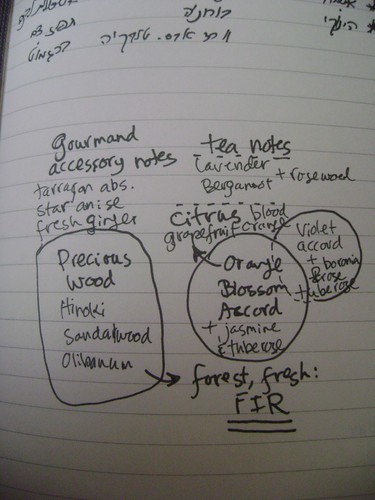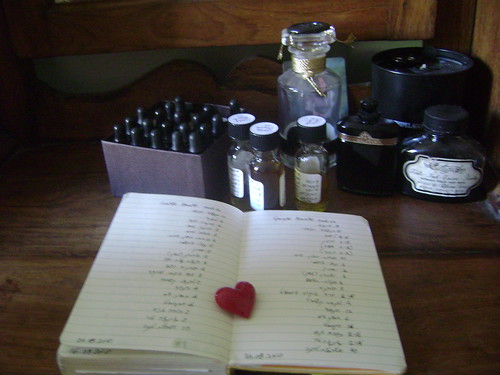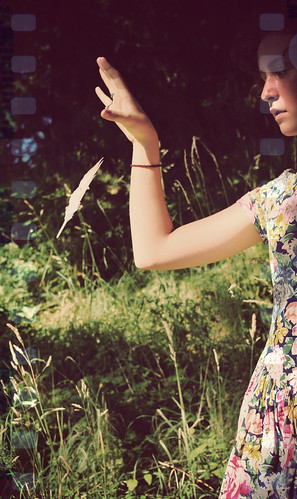It’s been 2 weeks since I last told you anything about the development of the Gentille Alouette perfume. And this quote is pushing ahead of a the game a bit.. But this is the reaction I was hoping for when I was labouring at my lab and trying to bottle Eliza’s vision for what she would smell like.
By now you are all probably dying to read what essences did we actually pick together?
Well, I can’t tell you everything, can I?
What I will tell you is that this Gentille Alouette perfume was going to be a violet and orange blossom scent with a big retro wink and one foot set in the forests of the Sunshine Coast, where Eliza prefers to spend her free time. It had to be very girly and at the same time have enough adventurous outroodsiness to it to save it from going totally frou-frou. This is just not who Eliza is, and it’s not what Gentille Alouette’s frequent guests are either. These are girls who like to play dress up but also like to use their bicycles rather than get driven by a cab so they can show off their stilettos… The shop is like a little hidden closet you find all of a sudden, full of fashion finds of all sorts: vintage jewels and beaded clutches, hand-crafted gowns and accessories, recycled and reclaimed one-off pieces, and wardrobe staples from small brands that keep rotating – you’ll find something new to discover at the shop every week and unless we meet at my studio, I always end up playing dress-up by the end of every meeting with Eliza. The women who shop there are individualistic, kind spirited and seem to care about the environment as much as they care about their appearance.
But I digress… This post was not going to be about marketing schemes and dissecting the target market of my client and her future perfume. It’s going to be about the creative process that leads to a perfume. Perfume walks the tightrope between art, luxury, fashion and a commodity, so all those factor re just as valid: price range, target market and profitability (or at least breaking even…) are just as important factors as is the originality of the scent, the mood it will evoke once worn, the story behind each raw material, and the artistry that goes into blending all these elements together: perfume, personality, wearability.
I left Eliza’s shop some 2 weeks ago with no less than 20 essences that she loved, and that seem to work together beautifully. Nearly all of them are utterly precious: violet leaf, orange blossom, rose, boronia, tuberose… Each can be the centerpiece of a perfume and take the show. Yet I had to make them all shine together, rather than individually. Which was not easy. To top it off, Eliza also wanted fir absolute AND hinoki in this perfume. I decided to leave the hinoki to later, if necessary, and for now work with the fir only and create two version – one with, and one without.
 Perfumer's Notebook, originally uploaded by Ayala Moriel.
Perfumer's Notebook, originally uploaded by Ayala Moriel.To help me not loose focus, I drew a little diagram that shows the dynamics between the different notes: how they relate to one another and how they play different roles in different accords. Eliza loves tea, and she picked some tea like notes: bergamot, which reminds her of Earl Gray tea. Lavender, which is calming and relaxing (she also saws those little tiny lavender cat brooches with buttoned eyes – they’re adorable and give whiffs of lavender whenever you squish them a bit, to give you a fix of relaxation when you’re out and about…).
Citrus notes blood orange and grapefruit will perform the role of bursting open the experience alluring you in from the get go.
And the flowers, of course, are the starts of the show, but they divide into two – the orange blossom accord and the violet accord (so you see, the rose is here only in a supporting role to the timid violet).
Surprising gourmand notes are what will give the perfume a quirky touch, a surprise: star anise and tarragon absolute, along with fresh ginger.
And than there is fir absolute – which is also a woodsy note, but very, very sweet and almost like a jam made of the entire forest and delivered to your door on Christmas Day… So it joins together the gourmand and the woods – the more meditative notes of sandalwood, frankincense and maybe, but only maybe, hinoki…
I spent 2 main sessions with Gentille Alouette in the lab. My first try (August 20th) was based strictly and almost analytically on the sessions we had with Eliza. I thought it to be a little timid, and I was very careful with the concentration – making it rather light. I used only very light hand with the boronia (pre-diluted at 30%) and violet (pre-diluted at 10%). And I made two versions that day: one with a tiny bit of fir, and one without.
I let it sit for a while, and than I thought – why not just get my imagination go wild a bit and compose Gentille Alouette perfume as I envisioned it when I first met Eliza at the studio, and she told me that her favourite scents are violet and orange blossom… She liked White Potion, Zohar and Violat and my little olfactory bulb was sending me signals of what these three, plus a hint of boronia, will smell like… I set off again, 5 days later, (August 24th) and blended that: a rich, dense version with higher concentrations of boronia absolute and violet leaf absolute, both at full strength. I added no fir whatsoever and stayed true to my vision.
I tweaked it just a bit this morning, before I met Eliza: I added another drop of Boronia absolute. I divided the batch into two, and added one drop of fir absolute to one bottle, which would make it the 4th mod of the Gentille Alouette scent. I think the fir was the element that was missing from giving it just that little extra smooth roundedness yet without using vanilla (Eliza clearly does not like this note an I was not going to convince her otherwise! There are enough vanilla-laden florals out there, and her perfume does not need it). I’m loving this perfume and I think I’ve nailed it on the head, but it’s going to be up to Eliza to decide what’s best for her. And also if we’re going to do a parfum extrait or an Eau de Parfum…
Stay tuned to hear about the following: what mod Eliza picked, and how we are going to tackle the next biggest problem: packaging.
 Tonight, November 4th, 5:00 p.m. - 11:00 p.m it is Gastown Fall Shop Hop. Click on the image above to enlarge it and see all the participating shops and boutiques. They will all be open till late tonight and have special discounts and complementary
Tonight, November 4th, 5:00 p.m. - 11:00 p.m it is Gastown Fall Shop Hop. Click on the image above to enlarge it and see all the participating shops and boutiques. They will all be open till late tonight and have special discounts and complementary







